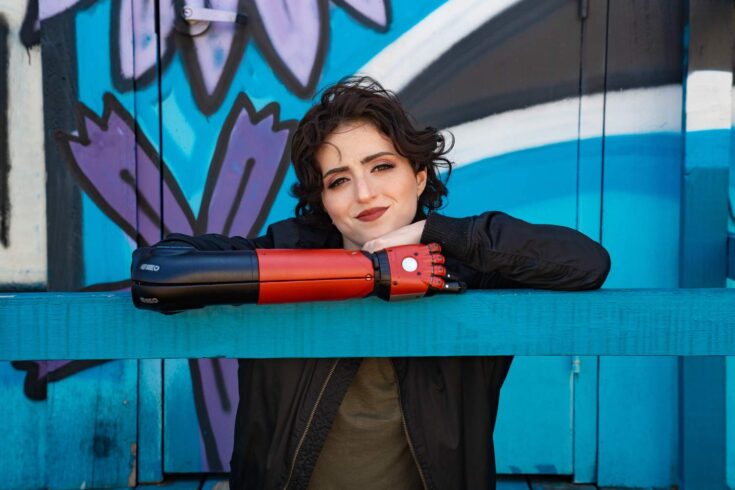Imagine going to wash your hands at work. The bathroom has been renovated with automatic soap dispensers. You place your hand under the dispenser, waiting for the soap. It doesn’t come. It must be broken. You try each soap dispenser and have the same problem. Strange that they all do not work. Your colleague comes along and puts their hand under the dispenser before you can tell them they do not work. Except, it works for them. The difference? The colour of your skin.
This example of an exclusive innovation went viral in 2015, when T.J. Fitzpatrick posted a video online of sinks at the Atlanta Marriott hotel.
The soap dispenser failed to detect dark skin but worked fine on light skin. This is one example of an extensive list of innovations that have not been designed with all users in mind. The result: a product that is not fit for purpose.

Credit: FatCamera, E+ via Getty Images
We need inclusive design
Companies need to carefully consider diversity and inclusion into the design of their products, services and business models. If not, they not only deepen social divides and face public relations disasters, but they narrow their potential markets and diminish their chances of commercial success.
This needs to change, and we at Innovate UK have a responsibility to support businesses to develop innovations that consider the needs of diverse individuals. We want everyone to be able to access important, and often life-enhancing, products, processes and services. We believe that innovations must be better designed to be more inclusive and accessible, delivering better outcomes for all, in both society and businesses.
Inclusive Innovation Awards
That is why we’re pleased to announce the Inclusive Innovation Awards. We will provide a £50,000 award for up to 50 organisations from across the UK who are championing equality, diversity and inclusion in innovation. The awards are an opportunity to celebrate those already doing this, promoting them as role models for other businesses.
Watch the recording from the 26 September briefing event.
What is an inclusive innovation?
What do we mean by an ‘inclusive innovation’? Everyone will bring their own perspective to inclusion in innovations, and we welcome different ideas and ambitions.
We define an ‘inclusive innovation’ as one that places equality, diversity and inclusion at the centre of development of a:
- product
- process
- service.
Importantly, the innovation must address a challenge.
Supporting information
The innovations considered for these awards could follow:
- universal design principles (intentionally designed for a broad range of potential users)
- inclusive design principles (specific solutions for people who are usually excluded).
Inclusive innovation could involve scaling existing practices of a company to venture into a new market or developing a new product.
We do not have an exhaustive list of these, but some examples include:
- technologies that give people with disabilities a more independent life
- product development based on user research from a broad range of demographics
- services that promote representation and help build a more inclusive society.
An inclusive innovation must focus on one or more of the following:
- protected characteristics, including:
- age
- sex and gender
- gender reassignment
- ethnicity
- disability
- sexuality
- religion
- marriage and civil partnership
- pregnancy and maternity
- socio-economic status
- levelling-up
- caring responsibilities
- educational background.
We are purposefully keeping this remit broad, as we want to celebrate the diversity of innovations that companies across the UK are developing.

Credit: anyaberkut, iStock, Getty Images Plus via Getty Images
Inclusive innovations yield better products and economic benefits
New technologies, products and services certainly help tackle our largest industrial challenges, but they can also deepen existing inequalities and widen societal gaps if inclusion isn’t considered from the outset. For example:
- having access to online services such as car insurance and energy payments increases the availability of cheaper payment tariffs, affecting 14 million people in the UK from low-income households
- quiet hybrid and electric vehicles are 40% more likely to collide with pedestrians than cars with a regular combustion engine
- when medical testing is conducted primarily in males, it can result in reports of more unwanted, and sometimes deadly, side effects for females.
It is essential that innovations are designed to prevent these kinds of injustices and to deliver better societal outcomes. This will, in turn, realise significant economic benefits for businesses and the UK economy. For example, businesses are losing out on £2 billion a month by ignoring the needs of disabled customers. There are huge benefits of inclusive innovations, to both society and businesses.
Inclusive innovation in action
Some of our award winners from other Innovate UK competitions are delivering outstanding inclusive innovations. These provide some useful examples of the types of innovations that could be eligible for the Inclusive Innovation Awards.
Universal innovations, specifically designed for all

Credit: Becca Hume
Belfast-based Women in Innovation grant holder Becca Hume developed TapSOS.
TapSOS is an app that enables anyone to quickly and silently contact emergency services, with a clear use case for some disabled people.

Credit: Pearce Jarrett
Gwaan is an artificial trainer in your pocket developed by Young Innovator grant holder Pearce Jarrett.
With built-in workouts for people in wheelchairs, Gwaan is making home training more accessible for all.
Inclusive innovations, designed for a commonly excluded audience

Credit: Dilrini De Silva
Women in Innovation award winner Dilrini De Silva founded biotechnology firm Jana Bio. The company is improving treatment options for ethnic minority populations currently underrepresented in medicines development.
Jana Bio combines artificial intelligence with state-of-the-art stem cell engineering techniques to generate important insights for patient selection for clinical trials.

Credit: Open Bionics
Open Bionics, a Bristol-based company have created Hero Arm with support from Innovate UK’s Sustainable Innovation Fund. Hero Arm is the world’s first 3D printed bionic arm for individuals with below-elbow limb differences.
Open Bionics has recently created an open clinic to make their Hero Arms more accessible to potential users.

Credit: Winnie Awa
Carra is a pioneering platform developed by consumer tech expert and Women in Innovation grant holder Winnie Awa.
Carra offers expert advice, tailored hair care routines and unbiased product recommendations to match individual hair textures, meeting the needs of the UK’s fast growing multicultural population.
These are just some examples of our diverse portfolio. The Inclusive Innovation Awards aim to widen our reach in this area and celebrate those businesses at the forefront of inclusive innovation.
The award
Does your company have an existing inclusive innovation that has achieved demonstrable impact? Are you looking to extend your work supporting equality, diversity and inclusion within innovations? If you answered yes to both of those questions, then your business could be a future role model with our Inclusive Innovation award.
We plan to support organisations who are champions of innovation, and put equality, diversity and inclusion at the heart of what they do. Open to micro and small-to-medium sized companies, the £50,000 awards will enable winners to scale their innovation or create new products, processes or services. A campaign will provide the cohort of businesses with press opportunities to highlight their work and influence positive change in other businesses.
As part of their project, the grant holders will be expected to spend at least five days over the duration of the award being a role model to other businesses. In addition, they will support the Innovate UK family in activities that encourage other businesses to realise the benefits of inclusive innovations.
The Inclusive Innovation Awards are for companies who have already had a significant inclusive impact with previous innovations. This is because we want to celebrate companies who are already the forefront of this, supporting them to go further, and encourage others in the process.
If you have a great idea but you haven’t yet got a track-record in producing inclusive innovations, then you wouldn’t be eligible. If this is the case, one of Innovate UK’s other funding competitions may be more appropriate for you.
We will be assessing eligible applications with a portfolio approach, to ensure that organisations supporting a range of societal needs and businesses from across the UK are represented.
Do you need support applying?
Diversity and inclusion is a priority at Innovate UK, and we welcome and encourage applications from people of all backgrounds. We are committed to making our application process accessible to everyone. This includes providing support for people who have a disability or long-term condition and face barriers applying to us.
If you would like any support, please contact customer support service on 0300 321 4357 or support@iuk.ukri.org
Want more information?
The Inclusive Innovation Awards will open on the Innovation Funding Service on 26 September.
As this is a brand-new award, you’ve probably got more questions. Innovate UK KTN has an information page where you can find out more about the award and see answers to questions. The web page will get updated in the run-up to applications closing, so make sure you bookmark it!
Watch the recording from the 26 September briefing event.
If you have any questions, please contact Innovate UK’s customer support on 0300 321 4357 or email support@innovateuk.ukri.org
Further information
Connect with Katy Petherick on LinkedIn.
Follow Innovate UK on Twitter.
Connect with Innovate UK on LinkedIn.
Follow Innovate UK on Facebook.
You can go to the new Innovate UK website.
You can go to the Innovate UK EDGE website.
Subscribe to our YouTube channel.
Sign up for our email newsletter.
Top image: Laiken Olive (they/them), a 21-year-old artist from South Louisiana, who was the first recipient of the ‘Venom Snake’ bionic arm. Credit: Open Bionics




